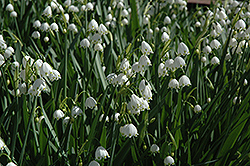Plant Height: 18 inches
Flower Height: 28 inches
Spacing: 14 inches
Sunlight:
![]()
![]()
Hardiness Zone: 4a
Description:
This variety is a larger-flowered version of the species; elegant nodding white bell flowers with muted green dots over the strap shaped, glossy dark green leaves; excellent for borders, rock gardens, pond margins, or containers
Ornamental Features
Gravetye Giant Summer Snowflake features showy lightly-scented nodding white bell-shaped flowers with olive green spots at the ends of the stems in mid spring. The flowers are excellent for cutting. Its glossy sword-like leaves remain dark green in colour throughout the season.
Landscape Attributes
Gravetye Giant Summer Snowflake is a dense herbaceous perennial with a more or less rounded form. Its medium texture blends into the garden, but can always be balanced by a couple of finer or coarser plants for an effective composition.
This is a relatively low maintenance plant, and should be cut back in late fall in preparation for winter. It is a good choice for attracting bees and butterflies to your yard. It has no significant negative characteristics.
Gravetye Giant Summer Snowflake is recommended for the following landscape applications;
- Mass Planting
- Rock/Alpine Gardens
- Border Edging
- General Garden Use
- Container Planting
Planting & Growing
Gravetye Giant Summer Snowflake will grow to be about 18 inches tall at maturity extending to 28 inches tall with the flowers, with a spread of 18 inches. When grown in masses or used as a bedding plant, individual plants should be spaced approximately 14 inches apart. Its foliage tends to remain dense right to the ground, not requiring facer plants in front. It grows at a fast rate, and under ideal conditions can be expected to live for approximately 10 years. As an herbaceous perennial, this plant will usually die back to the crown each winter, and will regrow from the base each spring. Be careful not to disturb the crown in late winter when it may not be readily seen! As this plant tends to go dormant in summer, it is best interplanted with late-season bloomers to hide the dying foliage.
This plant does best in full sun to partial shade. It prefers to grow in average to moist conditions, and shouldn't be allowed to dry out. It is not particular as to soil type or pH. It is somewhat tolerant of urban pollution. Consider applying a thick mulch around the root zone over the growing season to conserve soil moisture. This is a selected variety of a species not originally from North America. It can be propagated by multiplication of the underground bulbs; however, as a cultivated variety, be aware that it may be subject to certain restrictions or prohibitions on propagation.
Gravetye Giant Summer Snowflake is a fine choice for the garden, but it is also a good selection for planting in outdoor pots and containers. It can be used either as 'filler' or as a 'thriller' in the 'spiller-thriller-filler' container combination, depending on the height and form of the other plants used in the container planting. Note that when growing plants in outdoor containers and baskets, they may require more frequent waterings than they would in the yard or garden.
Disclaimer - This resource is provided for informational purposes only and does NOT reflect current availability. Inventory varies seasonally, so we cannot guarantee that every plant will be in stock at all times - please contact your favourite GardenWorks location directly for current availability. It does not include our entire inventory of plants, so be sure to visit GardenWorks to see varieties that may not be represented on this list.

